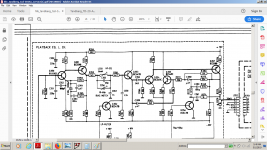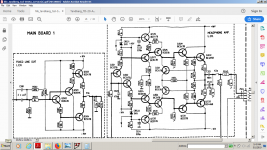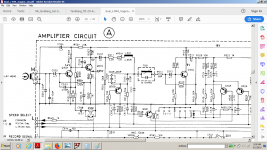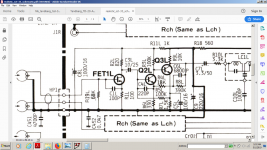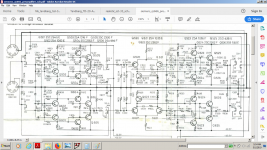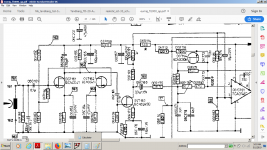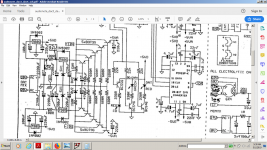I agree the PSRR is over stressed in audio with modern IC devices. There are plenty of good regs out there and the humble 7815 is not bad. As you say Richard, add a cap multiplier if you are worried about it.
Sure, the 7815 is not bad, but it's not very good either. Good regulators have lower output impedance over a much wider frequency range. I believe that even with circuits with good PSRR a superior regulator makes an audible difference. Of course, I have absolutely no evidence to back that up. 🙂
Just some other cap coupled stages of yesterday...I wondered what geniuses must have been the Tandberg guys to keep all their sh..t together in that schematic and give a masterpiece of tape recording with no fet transistor and no global feedback , but look at their headphones amp section!
That is the next amp i'm going to build!
It fully got my attention.
That is the next amp i'm going to build!
It fully got my attention.
Attachments
Dreamth - you should read all of Bateman’s papers on electrolytic capacitors before you go further.
Hers a link to one of them, it clearly shows the lowest distortion in electrolytics is for a bipolar electrolytic ( and even better is a series pair of bioplars.)
https://linearaudio.nl/sites/linear...0 to 100uF caps and 100 Hz measurements_0.pdf
And good luck finding the Japanese transistors in your project schematics
Hers a link to one of them, it clearly shows the lowest distortion in electrolytics is for a bipolar electrolytic ( and even better is a series pair of bioplars.)
https://linearaudio.nl/sites/linear...0 to 100uF caps and 100 Hz measurements_0.pdf
And good luck finding the Japanese transistors in your project schematics
Last edited:
Sure, the 7815 is not bad, but it's not very good either.
Its not very good particularly at low output currents, when the output impedance is much higher. If you're powering just a couple of opamps you'd be much better served as regards output impedance with a TL431 shunt.
Yes, I've noticed him saying this too. So @JC - does it seem to you that you 'fight the idea of un-sighted listening with a passion' ? Or do you simply avoid it - in the way I avoid Brussels Sprouts - because it doesn't suit your purpose?
That was sweet of you to put words in his mouth. What do you take his purpose to be which is so unsuited to ears-only evaluatin?
What do you take his purpose to be which is so unsuited to ears-only evaluatin?
I can only speculate but could be that he's interested in qualitative improvements rather than differences?
The best regulator is no regulator...but let's just see what Audio note did with the 7805 maybe we get something out of it:Sure, the 7815 is not bad, but it's not very good either. Good regulators have lower output impedance over a much wider frequency range. I believe that even with circuits with good PSRR a superior regulator makes an audible difference. Of course, I have absolutely no evidence to back that up. 🙂
Attachments
Last edited:
.. let's just see what Audio note did with the 78l05 maybe we get something out of it:
Good use of CRC on the input side. The utility of the output side though escapes me....
I can only speculate but could be that he's interested in qualitative improvements rather than differences?
Certainly. Who cares otherwise?
Last edited:
I can only speculate but could be that he's interested in qualitative improvements rather than differences?
If an improvement isn't different what is it? And I don't subscribe to the blind = ABX argument.
I have read it all 3 years ago as part of the job spec i had! I was payed to read Cyril's articles if you can believe it!Dreamth - you should read all of Bateman’s papers on electrolytic capacitors before you go further.
Hers a link to one of them
https://linearaudio.nl/sites/linearaudio.net/files/Bateman%20EW%2001%202003%20mar2003%2010%20to%20100uF%20caps%20and%20100%20Hz%20measurements_0.pdf
And good luck finding the Japanese transistors in your project schematics
Better read here:
Nichicon Muse ES bipolar caps measured: <-120dB THD, <-140dB IMD
And i have all the transistors i might ever need.I have literally a ton of vintage equipment in my little apartment...No insect dares to enter my home because of the smell 🙂
If an improvement isn't different what is it?
All improvements will be different but not all differences will be improvements.
And I don't subscribe to the blind = ABX argument.
Let's take this one step at a time - @JC hasn't responded to my question yet 😀
All improvements will be different but not all differences will be improvements.
If you could enlighten me on how seeing or not helps sort that out it would be appreciated.
I took myself the time to build a loaded capacitance multiplier this way and i was please with the results, but indeed , 78lxx series is very good .I use them extensively everywhere and load it accordingly...Most people load it minimally but they need more than 5...10ma load to work best and besides that i always put enough low esr capacitance at the output.Good use of CRC on the input side. The utility of the output side though escapes me....
Last edited:
If you could enlighten me on how seeing or not helps sort that out it would be appreciated.
Easy, if you can see what you are listening to you can tell whether the difference is an improvement. In many cases it also makes differences apparent, like they materialize out of thin air!
If you could enlighten me on how seeing or not helps sort that out it would be appreciated.
It was merely my speculation you're engaging with. I admit my speculation could well be in error. Seems too academic to me to continue with this line of discussion until @JC responds to falsify (or other) the speculation.
The thinking behind my speculation was that I've only ever heard of blind testing to be done in conjunction with trying to hear differences. When I asked a proponent of blind testing (on this forum) how to use it in order to listen for improvements he informed me that I would need to confirm that there was indeed a difference first but gave me no reasoning. I didn't find that assertion at all convincing myself, if you have reasoning then I'm all ears.
There was a psychological study in the 50's in the USA, where two groups of people were asked to put their palms over a small hole made in a box and tell if they feel anything at any time.One group was told that in the box is a light and someone is acting a switch randomly so that group was notified that they need to feel when the light was on.The other group was not told anything.
After many trials , the statistics was like this: The group who knew about the light was able with some "training " to get the time when the switch was on in about 70% of the cases while the group who wasn't told the secret was never able to tell when the switch was on.
The conclusion was that our senses are also educated by our expectations and in the end the cells in out skin have the basic ability as any other living cell to perceive light as form of energy but it's only the eye who is specialized and wired to the brain in a more efficient way.
Even the ABX box can be cheated with proper training.
YouTube
https://youtu.be/ppe4O1H4tIw?t=444
After many trials , the statistics was like this: The group who knew about the light was able with some "training " to get the time when the switch was on in about 70% of the cases while the group who wasn't told the secret was never able to tell when the switch was on.
The conclusion was that our senses are also educated by our expectations and in the end the cells in out skin have the basic ability as any other living cell to perceive light as form of energy but it's only the eye who is specialized and wired to the brain in a more efficient way.
Even the ABX box can be cheated with proper training.
YouTube
https://youtu.be/ppe4O1H4tIw?t=444
Last edited:
Seems too academic to me to continue with this line of discussion
That's fine these discussions have a habit of being pointless. I'm simply appealing (in my mind) to common sense. This audiophile community of absolute integrity and lack of bias has not manifested itself to me.
Even the ABX box can be cheated with proper training.
Yes that was me, easy.
Works for both sides of any question.
Quite true.
Don't know why JC says what he does about blind testing. Don't know if he will tell us either. Of course, it is well known there is some general tendency for hearing to change with age. Seeing as how some people may still be working for a living, maybe better not to pry too much.
- Status
- Not open for further replies.
- Home
- Member Areas
- The Lounge
- John Curl's Blowtorch preamplifier part III
